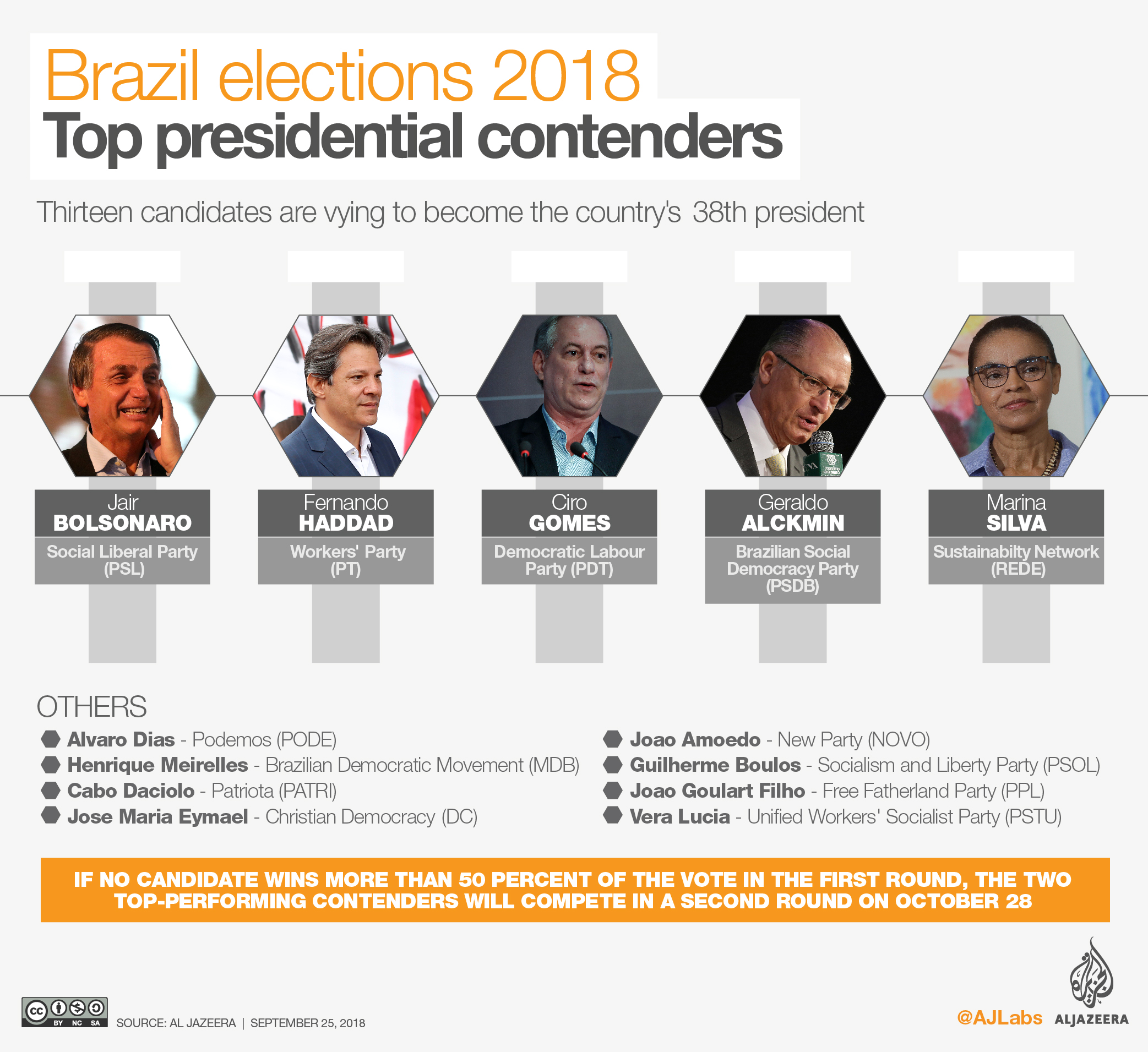Brazil election frontrunner Bolsonaro skips final debate
Rio de Janeiro, Brazil – Brazil’s far-right presidential frontrunner Jair Bolsonaro has skipped a final television debate in favour of a one-on-one interview just three days ahead of the country’s national and state-level elections.
Bolsonaro’s appearance on Thursday on Rede Record marked his return to the campaign trail after being stabbed while canvassing support last month.
Rede Record is owned by an Evangelical bishop who has publicly backed the former army captain’s bid for office. The interview, which took place at Bolsonaro’s home, coincided with the final pre-election presidential debate at broadcasting competitor Globo Television’s headquarters in Rio de Janeiro.
Bolsonaro, who claimed that he couldn’t attend the debate due to his medical condition, vowed to unite the country that he said had been divided by the leftist Workers’ Party (PT).
A self-styled political outsider, Bolsonaro has consistently topped opinion polls in the run-up to Sunday’s election and is projected to win up to 35 percent of the vote, according to the Datafolha polling institute.
He has made several discriminatory comments on race, gender and sexual orientation as well as a number of remarks expressing support for the country’s former military government – in power from 1964 to 1985 – which have angered and alarmed tens of millions of Brazilians.
Fernando Haddad, the leftist PT’s replacement candidate for widely popular jailed former president Luiz Inacio “Lula” da Silva, is in second place, according to the projection, with about 22 percent support.
If no candidate wins an absolute majority on Sunday, a second-round vote between the top two performers will take place on October 28.
 |
‘Took audiences away’
Fabio Vasconcellos, a coordinator at the Getulio Vargas Foundation (FGV) higher education institute, said Bolsonaro’s move on Thursday had two significant effects.
“First it took audiences away from the debate [on Globo] and over to Rede Record, where he was able to speak freely without his adversaries present. It also made his main opponent Fernando Haddad the target of other candidates present at the debate,” Vasconcellos told Al Jazeera.
Haddad, for his part, appeared keen at the Globo debate to direct attention away from Bolsonaro and focus instead on shoring up his support among the PT’s predominantly working-class electoral base.
“We are going to get back the reins of the country. We need to diminish the taxes on the poor and improve the economy to generate more jobs,” said Haddad.
Brazil’s economy has struggled to break out of a fiscal malaise which has weighed on the country since last year when it emerged from its worst recession in recorded history.
More than 12 percent of Brazilians – nearly 13 million people – are jobless, according to the Brazilian Institute of Geography and Statistics (IBGE).
 |
‘A third way’
In the debate, other candidates chose a different approach and several asked voters not to succumb to polarisation, which has swelled during this election.
Bolsonaro and Haddad have rejection rates that stand at at least 40 percent, according to Datafolha.
Ciro Gomes, Geraldo Alckmin and Marina Silva – a trio of centrists who have all run for the presidency at least once before and are in third, fourth and fifth place respectively according to projections – all appealed to voters to support neither of the two candidates.
Collectively, the trio is not expected to win more than 23 percent of the vote.
“The biggest problem in Brazil right now is that we have two opposite points of view – the ones who support Lula on one side and the ones who support Bolsonaro,” Gomes said.
Marina Silva, meanwhile, said she represented a “third way” for the electorate.
“We saw Gomes trying to position himself as an alternative to Bolsonaro and Haddad, with Silva also adopting the same discourse against polarisation,” Vasconcellos said.
“[And] Alckmin was focusing on targeting the PT.”
 |
| Ciro Gomes is trailing in third place behind Haddad in Bolsonaro in opinion polls [David Child/Al Jazeera] |
Undecided voters
The Globo event traditionally marks a critical moment within Brazilian presidential election cycles, as it is the last debate prior to first-round voting.
Bolsonaro’s no-show is unlikely to weaken his “impenetrable” electoral base but it could reduce his chance of winning support from voters who are still undecided, according to Alessandra Alde, a political scientist at the University of the State of Rio de Janeiro.
“There are voters who are with him no matter what and it is unlikely they would change their mind,” said Alde. “But there is still a portion of voters who are undecided, [and] Bolsonaro not showing up may be poorly viewed by this electorate.”
About five percent of voters, according to Datafolha, are yet to make up their minds on who to back for the country’s highest political office.
About 147 million people are expected to vote on Brazil’s presidency and more than 1,650 other national and state level positions. Participation is compulsory for all “literate” citizens aged 18 to 70.




